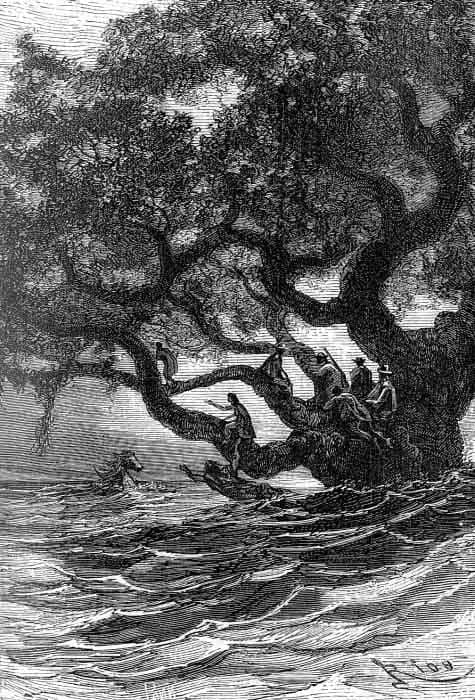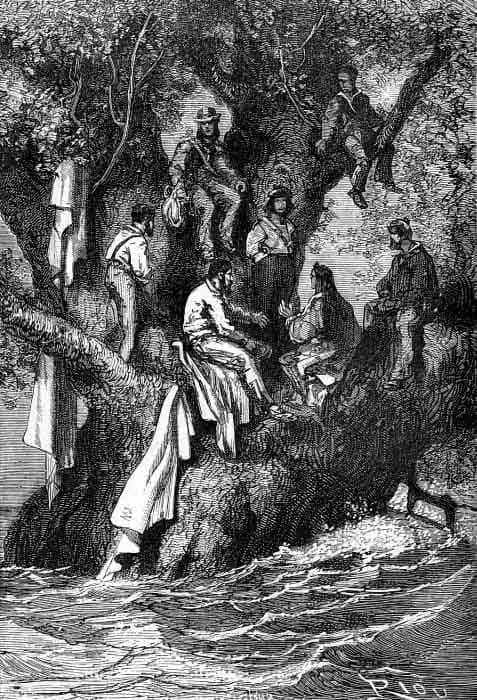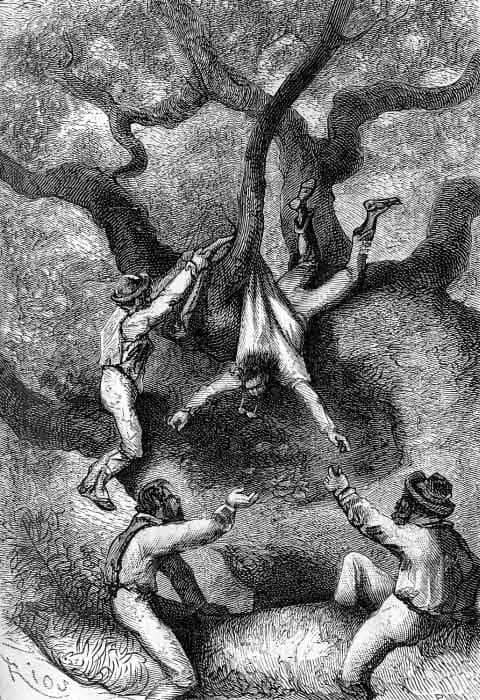CHAPTER XXIII.
A SINGULAR ABODE.
The tree upon which Glenarvan and his companions had just found refuge resembled a walnut-tree. It had the same shining foliage and rounded form. It was the “ombu,” which is met with only on the Argentine Plains. It had an enormous, twisted trunk, and was confined to the earth not only by its great roots, but also by strong shoots which held it most tenaciously. It had thus resisted the force of the inundation.
This ombu measured one hundred feet in height, and might have covered with its shade a circumference of three hundred and sixty feet. All the upper part rested on three great branches, which forked from the top of the trunk, that was six feet in diameter. Two of these branches were nearly perpendicular, and supported the immense canopy of foliage, whose crossed, twisted, and interlaced limbs, as if woven by the hand of a basket-maker, formed an impenetrable shelter. The third branch, on the contrary, extended almost horizontally over the roaring waters; its leaves were bathed in them, while it seemed a promontory to this island of verdure surrounded by an ocean. There was abundant space, also, in the interior of this gigantic tree. The foliage, which was not very dense at its outer circumference, left large openings like sky-lights, and made it well ventilated and cool. At sight of these branches rising in innumerable ramifications towards the clouds, while the parasitic convolvuli bound them to each other, and the rays of the sun shone through the interstices of the leaves, you would really have thought that the trunk of this ombu bore upon itself alone an entire forest.
On the arrival of the fugitives, a feathered population flew away to the top branches, protesting by their cries against so flagrant a usurpation of their dwelling. These birds, that had themselves sought refuge upon this solitary ombu, were seen by hundreds,—blackbirds, starlings, and many other richly-feathered varieties; and when they flew away it seemed as if a gust of wind had stripped the tree of its leaves.
Such was the asylum offered to Glenarvan’s little party. Robert and the nimble Wilson were scarcely perched in the tree, before they hastened to climb to the topmost branches. Their heads protruded above the dome of verdure. From this lofty position the view embraced a wide range. The ocean created by the inundation surrounded them on all sides, and their eyes could discern no limit. No other tree emerged from the watery surface; the ombu, alone in the midst of the unconfined waters, groaned at every shock. At a distance, borne along by the impetuous current, floated uprooted trunks, twisted branches, thatch torn from some demolished rancho, beams swept by the waters from the roofs of cattle-folds, bodies of drowned animals, bloody skins, and, on a swaying tree, a whole family of growling jaguars that clung with their claws to this fragile raft. Still farther off, a black speck almost invisible attracted Wilson’s attention. It was Thalcave and his faithful Thaouka, disappearing in the distance.

“Thalcave, friend Thalcave!” cried Robert, stretching out his hands towards the courageous Patagonian.
“He will be saved, Mr. Robert,” said Wilson; “but let us join Lord Glenarvan.”
A moment after, Robert and the sailor descended the three stories of branches and found themselves among their companions. Glenarvan, Paganel, the major, Austin, and Mulready were seated astraddle, or dangling in the branches, according to their own inclinations. Wilson gave an account of their visit to the top of the tree. All shared his opinion in regard to Thalcave. The only question was, whether Thalcave would save Thaouka, or Thaouka Thalcave.
The present situation of these refugees was undeniably insecure. The tree would not probably give way to the force of the current, but the rising waters might reach the top branches, for the depression of the soil made this part of the plain a deep reservoir. Glenarvan’s first care, therefore, was to establish, by means of notches, points of comparison which enabled him to note the different heights of the water. The flood was now stationary, and it appeared to have reached its greatest elevation. This was encouraging.
“And now what shall we do?” asked Glenarvan.
“Build our nest, of course,” replied Paganel.
“Build our nest!” cried Robert.
“Certainly, my boy, and live the life of birds, since we cannot live the life of fishes.”
“Very well,” said Glenarvan; “but who will give us our beakful?”
“I,” replied the major.
All eyes were turned towards MacNabb, who was comfortably seated in a natural arm-chair formed of two pliant branches, and with one hand was holding out the wet though well-filled saddle-bags.
“Ah, MacNabb,” cried Glenarvan, “this is just like you! You think of everything, even under circumstances where it is allowable to forget.”
“As soon as it was decided not to be drowned, I concluded not to die of hunger.”
“I should not have thought of this,” said Paganel, innocently; “but I am so absent-minded!”
“And what do the saddle-bags contain?” inquired Tom Austin.
“Provisions for seven men for two days,” replied MacNabb.
“Well,” said Glenarvan, “I hope that the inundation will be considerably lower twenty-four hours hence.”
“Or that we shall find some means of gaining terra firma,” added Paganel.
“Our first business, then, is to breakfast,” said Glenarvan.
“After drying ourselves,” observed the major.
“And fire?” said Wilson.
“Why, we must make one,” replied Paganel.
“Where?”
“At the top of the trunk, of course.”
“With what?”
“With dead wood that we shall cut in the tree.”
“But how kindle it?” said Glenarvan. “Our tinder is like a wet sponge.”
“We will manage that,” answered Paganel; “a little dry moss, a ray of sunlight, the lens of my telescope, and you will see by what a fire I will dry myself. Who will go for wood in the forest?”
“I!” cried Robert, and, followed by his friend Wilson, he disappeared like a cat in the depths of the foliage.
During their absence Paganel found dry moss in sufficient quantity; he availed himself of a ray of sunlight, which was easy, for the orb of day now shone with a vivid brightness, and then, with the aid of his lens, he kindled without difficulty the combustible materials which were laid on a bed of leaves in the fork of the branches. It was a natural fireplace, with no danger of conflagration.
Wilson and Robert soon returned with an armful of dead wood, which was cast on the fire. Paganel, to cause a draught, placed himself above the fireplace, his long legs crossed in the Arab fashion; then, moving his body rapidly up and down, he produced, by means of his poncho, a strong current of air. The wood kindled, and a bright, roaring flame soon rose from this improvised oven. Each dried himself in his own way, while the ponchos, hung on the branches, swung to and fro in the breeze.
They now breakfasted, sparingly however, for they had to allow for the following day. The immense basin might not perhaps be empty so soon as Glenarvan hoped, and, moreover, the provisions were limited. The tree bore no fruit; but fortunately it afforded a remarkable supply of fresh eggs, thanks to the numerous nests that loaded the branches, not to speak of their feathered occupants. These resources were by no means to be despised. The question now was, therefore, in case of a prolonged stay, how to secure comfortable quarters.
“Since the kitchen and dining-room are on the ground floor,” said Paganel, “we will sleep in the first story. The house is large, the rent reasonable, and we must take our ease. I perceive that above there are natural cradles, in which, when we have once laid ourselves, we shall sleep as well as in the best beds in the world. We have nothing to fear; moreover, we will keep watch, and there are enough of us to repulse all the wild animals.”
“Only we have no arms,” said Tom Austin.
“I have my revolvers,” said Glenarvan.
“And I mine,” replied Robert.
“What use,” continued Tom Austin, “if Mr. Paganel does not find the means of manufacturing powder?”
“It is not necessary,” replied MacNabb, showing a full flask.
“Where did you get that, major?” inquired Paganel.
“Of Thalcave. He thought it might be useful to us, and gave it to me before going back to Thaouka.”
“Brave and generous Indian!” cried Glenarvan.
“Yes,” added Tom Austin, “if all the Patagonians are fashioned after this model, I pay my respects to Patagonia.”
“I desire that the horse be not forgotten,” said Paganel. “He forms part of the Patagonian, and, if I am not greatly mistaken, we shall see them again.”
“How far are we from the Atlantic?” inquired the major.
“Not more than forty miles,” answered Paganel. “And now, my friends, since each is free to act, I ask permission to leave you. I am going to choose an observatory above, and, with the aid of my telescope, will keep you acquainted with what goes on here.”
The geographer was allowed to go. He very adroitly swung himself from branch to branch, and disappeared behind the thick curtain of foliage. His companions at once occupied themselves with making the sleeping-room and preparing their beds, which was neither a difficult nor a lengthy task. As there were no bedclothes to fix nor furniture to arrange, each soon resumed his place by the fire.
They then conversed, but not about their present condition, which they must patiently endure. They returned to the inexhaustible subject of Captain Grant’s recovery. If the waters subsided, in three days the travelers would be again on board the Duncan. But the captain and his two sailors, those unfortunate castaways, would not be with them; and it even seemed after this failure, after this vain search in South America, as if all hope of finding them were irrevocably lost. Whither direct a new search? What, too, would be the grief of Lady Helena and Mary Grant on learning that the future had no hope in store for them!
“Poor sister!” exclaimed Robert; “all is over for us!”

Glenarvan, for the first time, had no consoling answer to make. What hope could he give the child? Had he not followed with rigorous exactitude the directions of the document?
“At all events,” said he, “this thirty-seventh degree of latitude is no vain indication. Have we not supposed, interpreted, and ascertained that it relates to the shipwreck or the captivity of Captain Grant? Have we not read it with our own eyes?”
“All that is true, my lord,” replied Tom Austin; “nevertheless our search has not succeeded.”
“It is discouraging as well as annoying,” said Glenarvan.
“Annoying if you will,” replied MacNabb, in a calm tone, “but not discouraging. Precisely because we thus have a definite item, we must thoroughly exhaust all its instructions.”
“What do you mean?” inquired Glenarvan. “What do you think ought to be done?”
“A very simple and reasonable thing, my dear Edward. Let us turn our faces towards the east, when we are on board the Duncan, and follow the thirty-seventh parallel even around to our starting-point, if necessary.”
“Do you think, my dear major, that I have not thought of this?” replied Glenarvan. “Indeed I have, a hundred times. But what chance have we of succeeding? Is not leaving the American continent departing from the place indicated by Captain Grant himself, from Patagonia, so clearly named in the document?”
“Do you wish to begin your search in the Pampas again,” replied the major, “when you are sure that the shipwreck of the Britannia did not take place on the Pacific or Atlantic coast?”
Glenarvan did not answer.
“And however feeble the chance of finding Captain Grant by following this latitude may be, still ought we not to attempt it?”
“I do not deny it,” replied Glenarvan.
“And you, my friends,” added the major, addressing the sailors, “are you not of my opinion?”
“Entirely,” answered Tom Austin, while Wilson and Mulready nodded assent.
“Listen to me, my friends,” continued Glenarvan, after a few moments of reflection, “and you too, Robert, for this is a serious question. I shall do everything possible to find Captain Grant, as I have undertaken to do, and shall devote my entire life, if necessary, to this object. All Scotland would join me to save this noble man who sacrificed himself for her. I too think, however slight may be the chance, that we ought to make the tour of the world on the thirty-seventh parallel; and I shall do so. But this is not the point to be settled: there is a much more important one, and it is this: Ought we once and for all to abandon our search on the American continent?”
This question, so directly asked, was unanswered. No one dared to declare his opinion.
“Well?” resumed Glenarvan, addressing the major more especially.
“My dear Edward,” replied MacNabb, “it would involve too great a responsibility to answer you now. The case requires consideration. But first of all I desire to know what countries the thirty-seventh parallel crosses.”
“That is Paganel’s business,” replied Glenarvan.
“Let us ask him, then,” said the major.
The geographer was no longer to be seen, as he was hidden by the thick foliage. It was necessary to call him.
“Paganel! Paganel!” cried Glenarvan.
“Present!” answered a voice which seemed to come to them from the sky.
“Where are you?”
“In my tower.”
“What are you doing?”
“Surveying the wide horizon.”
“Can you come down a moment?”
“Do you need me?”
“Yes.”
“What for?”
“To know what countries the thirty-seventh parallel crosses.”
“Nothing easier,” replied Paganel; “I need not even disturb myself to tell you.”
“Very well, then.”
“Leaving America, the thirty-seventh parallel crosses the Atlantic.”
“Good.”
“It strikes Tristan d’Acunha Island.”
“Well?”
“It passes two degrees to the south of the Cape of Good Hope.”
“And then?”
“It runs across the Indian Ocean.”
“And then?”
“It grazes St. Paul’s Island of the Amsterdam group.”
“Go on.”
“It cuts Australia across the province of Victoria.”
“Proceed.”
“Leaving Australia——”
This last sentence was not finished. Did the geographer hesitate? Did he know no more? No; but a startling cry was heard in the top of the tree. Glenarvan and his friends grew pale as they gazed at each other. Had a new calamity happened? Had the unfortunate Paganel fallen? Already Wilson and Mulready were hastening to his assistance, when a long body appeared. Paganel dangled from branch to branch. His hands could grasp nothing. Was he alive, or dead? They did not know; but he was about to fall into the roaring waters, when the major, with a strong hand, arrested his progress.
“Very much obliged, MacNabb!” cried Paganel.
“Why, what is the matter with you?” said the major.

“What has got into you? Is this another of your eternal distractions?”
“Yes, yes,” replied Paganel, in a voice choked with emotion (and leaves). “Yes, a distraction,—phenomenal this time.”
“What is it?”
“We have been mistaken! We are still mistaken!”
“Explain yourself.”
“Glenarvan, major, Robert, my friends,” cried Paganel, “all you who hear me, we are seeking Captain Grant where he is not.”
“What do you say?” cried Glenarvan.
“Not only where he is not,” added Paganel, “but even where he has never been.”

